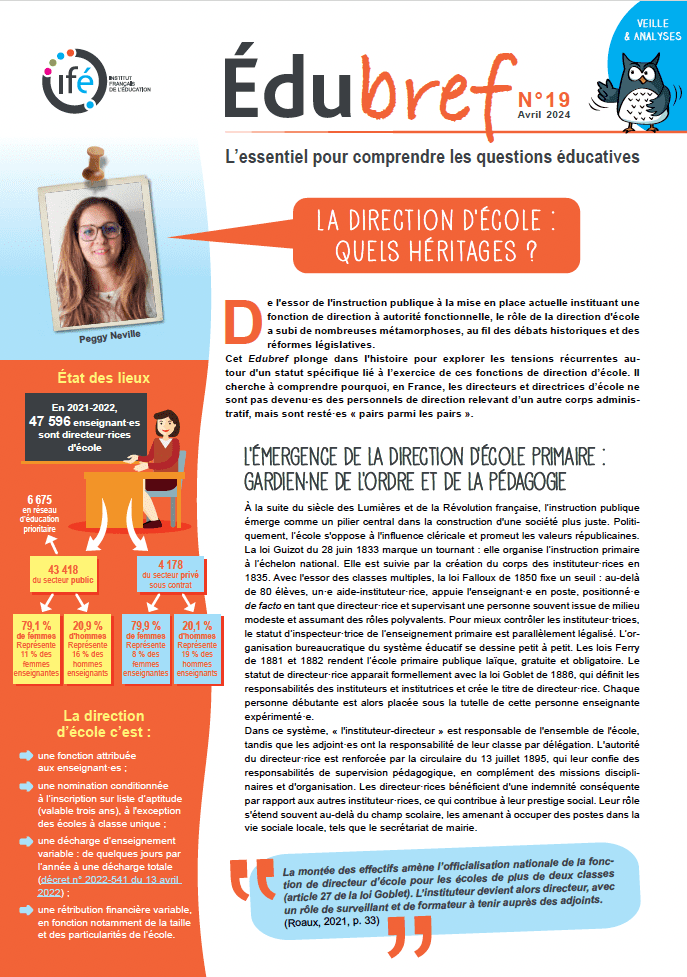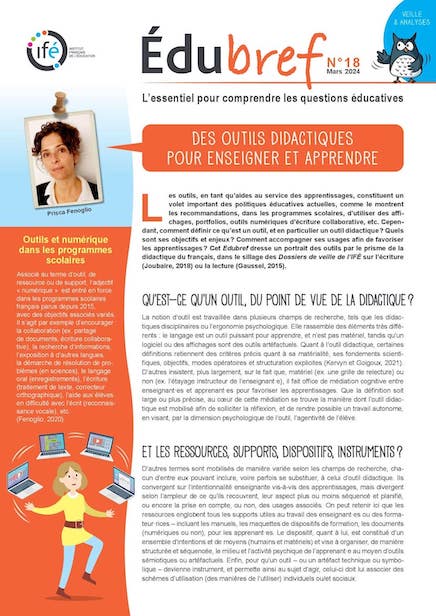Pays : France
Langue(s) : français
Auteur(s) : MOUHLI Inès
Date de soutenance : 2007
Thèse délivrée par : Université Lumière-Lyon 2
Section(s) CNU : section 70 : Sciences de l'éducation
Sous la direction de : Mohamed MILED & Robert BOUCHARD
Jury de thèse : BEN REJEB Bourguiba, CUQ Jean-Pierre, DELCAMBRE-DERVILLE Isabelle, Le BRAY Jean-Emmanuel, POCHARD Jean-Charles,
Notre recherche porte sur la maîtrise de l'écriture chez les étudiants spécialistes de français des universités tunisiennes, et plus précisément sur ceux de l'Institut Supérieur des Langues de Tunis et de la Faculté des Lettres de la Manouba. En première année d'université, on a tendance à considérer la maîtrise de l'écrit par l'étudiant comme un fait acquis puisque ce dernier est soumis dès son jeune âge à un apprentissage simultané de l'écrit dans deux langues (le français et l'arabe littéral), réussi puisque sanctionné par l'admission au Bac. Notre objectif est de tenter de comprendre les besoins effectifs des étudiants tunisiens à travers l'observation et l'analyse de leurs pratiques scripturales en langue française en nous intéressant tout autant aux capacités dont ils font preuve au cours de l'exécution de la tâche qu'on leur fixe qu'à leurs éventuelles carences. Nous nous sommes interrogée, tout particulièrement, sur l'influence de la formation universitaire qu'ils reçoivent sur ces savoir-faire, en examinant ses traces, langagières et métalangagières dans les comportements procéduraux comme déclaratifs de ces étudiants (similitudes et différences). Ils nous ont paru, en effet, de bons révélateurs de la compétence écrite en français qui est susceptible d'être acquise au sein du système scolaire et universitaire tunisien. Nous nous sommes intéressée, par ailleurs, à la situation sociolinguistique tunisienne, par rapport au français d'une part et à l'écrit en général de l'autre. Elle est à l'origine du rapport d'attraction/répulsion à l'écriture en français langue seconde qu'entretiennent ces étudiants. Enfin, à la suite de l'analyse des corpus effectuée et au vu des résultats recueillis, nous faisons quelques suggestions didactiques susceptibles d'aider à repenser certaines habitudes scripturales chez les étudiants et, chez les enseignants, certaines des méthodes de formation langagière mises en place dans le début de ce cursus universitaire.
Our research is about the mastery of the writing among the specialist students of French of the Tunisian universities, and more precisely on those of the University of the Languages of Tunis and the University of Arts of ¤Manouba¤. In first year of university, one tends to consider the mastery of the writing by the student like a fact acquire as this last is submitted since its young age to a simultaneous training of the writing in two languages (French and literal Arabic), successful since punished by the admission in the Baccalaureate exam. Our objective is to tempt to understand the efficient needs of the Tunisian students through the observation and the analysis of their scriptural practices in French language while interesting us not only to the capacities of which they give proof during the execution of the task we give them, but also to their possible deficiencies. We wondered, especially, on the influence of the academic training that they receive on this ability, while examining its traces, linguistics and meta-linguistics in the procedural behaviours as declarative of these students (likeness and differences). They appeared to us, indeed, good developers of written expertise in French that is susceptible to be acquired within the Tunisian school and academic system. We were interested, otherwise, to the Tunisian sociolinguistic situation in relation to French on the one hand and to the writing in general on the other. It is at the origin of the connection between attraction and repulsion to the writing in French language as a second language that these students maintain. Finally, following the analysis of the corpora done and within sight of the results collected, we make some didactic suggestions susceptible to help reconsider some scriptural habits among the students and, some of the linguistic training methods set up in the beginning of this academic degree course among the teachers.
mot(s) clé(s) : difficulté d'apprentissage, enseignement supérieur
Formation universitaire et compétences scripturales : le cas d’étudiants littéraires tunisiens en première année français d’enseignement supérieur
Auteur(s) : MOUHLI Inès
Date de soutenance : 2007
Thèse délivrée par : Université Lumière-Lyon 2
Section(s) CNU : section 70 : Sciences de l'éducation
Sous la direction de : Mohamed MILED & Robert BOUCHARD
Jury de thèse : BEN REJEB Bourguiba, CUQ Jean-Pierre, DELCAMBRE-DERVILLE Isabelle, Le BRAY Jean-Emmanuel, POCHARD Jean-Charles,
Notre recherche porte sur la maîtrise de l'écriture chez les étudiants spécialistes de français des universités tunisiennes, et plus précisément sur ceux de l'Institut Supérieur des Langues de Tunis et de la Faculté des Lettres de la Manouba. En première année d'université, on a tendance à considérer la maîtrise de l'écrit par l'étudiant comme un fait acquis puisque ce dernier est soumis dès son jeune âge à un apprentissage simultané de l'écrit dans deux langues (le français et l'arabe littéral), réussi puisque sanctionné par l'admission au Bac. Notre objectif est de tenter de comprendre les besoins effectifs des étudiants tunisiens à travers l'observation et l'analyse de leurs pratiques scripturales en langue française en nous intéressant tout autant aux capacités dont ils font preuve au cours de l'exécution de la tâche qu'on leur fixe qu'à leurs éventuelles carences. Nous nous sommes interrogée, tout particulièrement, sur l'influence de la formation universitaire qu'ils reçoivent sur ces savoir-faire, en examinant ses traces, langagières et métalangagières dans les comportements procéduraux comme déclaratifs de ces étudiants (similitudes et différences). Ils nous ont paru, en effet, de bons révélateurs de la compétence écrite en français qui est susceptible d'être acquise au sein du système scolaire et universitaire tunisien. Nous nous sommes intéressée, par ailleurs, à la situation sociolinguistique tunisienne, par rapport au français d'une part et à l'écrit en général de l'autre. Elle est à l'origine du rapport d'attraction/répulsion à l'écriture en français langue seconde qu'entretiennent ces étudiants. Enfin, à la suite de l'analyse des corpus effectuée et au vu des résultats recueillis, nous faisons quelques suggestions didactiques susceptibles d'aider à repenser certaines habitudes scripturales chez les étudiants et, chez les enseignants, certaines des méthodes de formation langagière mises en place dans le début de ce cursus universitaire.
Our research is about the mastery of the writing among the specialist students of French of the Tunisian universities, and more precisely on those of the University of the Languages of Tunis and the University of Arts of ¤Manouba¤. In first year of university, one tends to consider the mastery of the writing by the student like a fact acquire as this last is submitted since its young age to a simultaneous training of the writing in two languages (French and literal Arabic), successful since punished by the admission in the Baccalaureate exam. Our objective is to tempt to understand the efficient needs of the Tunisian students through the observation and the analysis of their scriptural practices in French language while interesting us not only to the capacities of which they give proof during the execution of the task we give them, but also to their possible deficiencies. We wondered, especially, on the influence of the academic training that they receive on this ability, while examining its traces, linguistics and meta-linguistics in the procedural behaviours as declarative of these students (likeness and differences). They appeared to us, indeed, good developers of written expertise in French that is susceptible to be acquired within the Tunisian school and academic system. We were interested, otherwise, to the Tunisian sociolinguistic situation in relation to French on the one hand and to the writing in general on the other. It is at the origin of the connection between attraction and repulsion to the writing in French language as a second language that these students maintain. Finally, following the analysis of the corpora done and within sight of the results collected, we make some didactic suggestions susceptible to help reconsider some scriptural habits among the students and, some of the linguistic training methods set up in the beginning of this academic degree course among the teachers.
mot(s) clé(s) : difficulté d'apprentissage, enseignement supérieur















